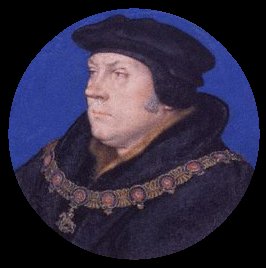Thomas Wolsey: Life Story
Chapter 11 : The End (1529 – 1530)
Henry had been suspicious for some time, owing to the seeds of doubt planted by Anne and her supporters, that Wolsey was not as diligent in pursuing the annulment as Henry required, and the failure of the Legatine Court seemed to support that fear. He was not, however, certain that he could, or should, try to manage without Wolsey. He also remained personally attached to the Cardinal.
Wolsey was in disgrace, but Campeggio asked that he be permitted to accompany him on Campeggio's visit to Grafton in Northamptonshire to take his leave of Henry. Henry agreed, much to the chagrin of Anne. When Wolsey arrived, it was to find there was no room for him at the house, but Sir Henry Norris, one of the King's gentlemen, took pity on him and let him use his own room.
On being allowed into the King's presence the Cardinal was unusually deferential to his assembled enemies, but he was soon chatting familiarly to the King again, tucked in a window embrasure, exchanging confidences.
Overnight, however, Anne hatched a plan to take the King hunting on the following day, leaving Wolsey to accompany Campeggio back to London. The knives were now out for Wolsey. He was indicted for praemunire (the useful expedient that was brought out from time to time to keep the Church in its place and which consisted of a charge of putting the Church above the King), which he admitted, beseeching the King to forgive him.
"I, your poor, heavy and wretched priest do daily pursue, cry and call upon Your Royal Majesty for grace, mercy, remission and pardon…"
In October 1529, Wolsey was stripped of his position of Lord Chancellor and told to remove from York House to Esher. En route, he was met by Sir Henry Norris, with a ring from the King. Grateful beyond words, Wolsey sank to his knees in the road, thanking the King for his kindness, which he reciprocated by sending his fool, "Patch" to the King's service – much to Patch's displeasure - he had to be taken by force.
Henry again sent positive messages in November, before Parliament opened, but Wolsey's enemies were baying for his blood, and the Lords introduced a bill to prevent Henry ever employing him in public office again. The bill contained an enormous list of, mainly ludicrous, charges, including embezzlement, putting the Cardinal's hat on the coinage, referring to himself in the same sentence as the King, and endangering the King's health by breathing infection on him.
Wolsey was ably defended in the Commons by his secretary, Thomas Cromwell, and the bill was dropped. The King, meanwhile, agreed to make such provision as he thought fit, bearing in mind the articles in the original bill. He did not wish to commit himself to never employing Wolsey again.

In the new year of 1530, Norfolk continued his assault, but, when Wolsey fell seriously ill, Henry exclaimed that he would not lose him for £20,000 and sent his own doctors, as well as another ring. He also persuaded Anne to send a token of esteem. Nevertheless, the pressure from Norfolk, Suffolk, Boleyn and the rest was unrelenting – it was now a fight to the death. If Henry re-established Wolsey in his favour, they could not hope to survive.
The Council, unable to persuade Henry to completely abandon him, went along with a full pardon on 12 th February, together with banishment to reside in his Archbishopric of York. Wolsey pleaded poverty and attempted to persuade the French and Imperial courts to send the arrears of pensions promised many years before. Henry, too, sent him £1,000. In April, he began his journey north. He remained at the Archbishopric's house at Southwell for some months, living more ostentatiously than was wise, in direct contravention of Cromwell's advice.
Wolsey, who had been so aware of the shifts of power, and had used his knowledge of men to attain the heights he had, now seemed to lose his head completely. He had obviously not grasped the level of Henry's attachment to Anne Boleyn, and he sought to undermine Norfolk, and the process of the annulment by writing to the Imperial Ambassador and taking an interest in Katharine's case.
Always busy, Wolsey occupied his time in his diocese acting more in conformity with his vows as a priest than ever before – dispensing charity, Confirming children and saying Mass. He had never actually been enthroned as Archbishop, so, despite needing the King's consent, which he neglected to ask for, he sent out summons to the northern convocation of clergy to attend his enthronement on 7 th November 1530.
This, together with information that a Papal Bull, threatening excommunication had been published, was enough to allow Henry to be persuaded that Wolsey was guilty of " presumptuous, sinister practices". On 1st November, a warrant was issued for his arrest. On 4th November Wolsey was arrested and carried towards London. By Saturday, 26th November, he was at the Greyfriars Abbey, Leicester. He had been sickening all the while, and, tumbling from his mule, told the Abbot that he was "come hither to leave (his) bones amongst (them)".
He died on the following Tuesday, uttering the famous words:
"If I had served my God as diligently as I have served my King, He would not have given me over in my grey hairs."
He was buried in the Abbey church, close to the grave of Richard III.
Wolsey was, without doubt, one of the proudest, vainest and most arrogant men to wield power in England, yet he was also devoted to his king, a promoter of peace where that was practicable, and determined to give England an important place in foreign affairs.
He was a patron of the arts and of education, and upheld the law impartially against the rich as well as the poor, whilst avoiding the harsh religious punishments so popular with his contemporaries. He worked indefatigably for the advancement of his country, and deserves a better reputation than he has.
This article is part of a Profile on Thomas Wolsey available for Kindle, for purchase from Amazon US and Amazon UK.



